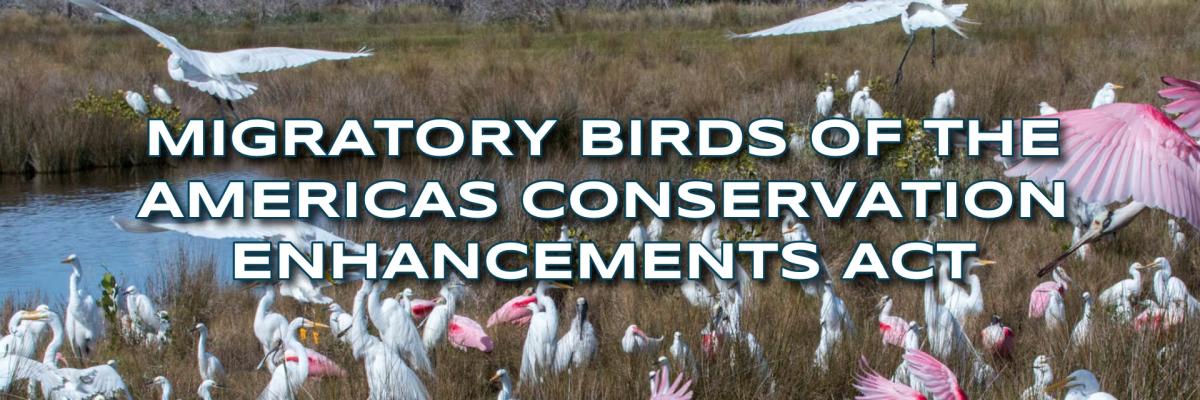House of Representatives Passes Salazar’s Legislation to Protect Migratory Birds of the Americas

WASHINGTON, D.C. – The House of Representatives passed Rep. María Elvira Salazar’s (R-FL) legislation (H.R. 4389) to protect iconic birds in Miami and throughout the Americas. The legislation is also co-led by Reps. Rick Larsen (D-WA), Dave Joyce (R-OH), and Mary Peltola (D-AK).
The Migratory Birds of the Americas Conservation Enhancements Act will safeguard our wildlife and the environment by ensuring migratory birds in South Florida and across the Americas are conserved for generations to come. The Florida Everglades is a critical habitat for many of these birds – including Egrets, Herons, and Ibis.
“Migratory birds provide innumerable ecological, economic, and recreational benefits to Miami and the Everglades, and this legislation will protect these iconic birds for generations to come,” said Rep. Salazar (R-FL). “By passing H.R. 4389, the House is making a commitment to the protection of our South Florida ecosystem while also boosting our wildlife recreation sector.”
The Neotropical Migratory Bird Conservation Act (NMBCA) provides competitive grants for habitat conservation, research and monitoring, and community outreach and education. The Migratory Birds of the Americas Conservation Enhancements Act of 2023 reauthorizes this program for the next 5 years. This bill will fund projects in the Western Hemisphere that have a positive impact on migratory birds.
Congresswoman Salazar is a champion of animal welfare and took to the floor of the House of Representatives to urge her colleagues to support this legislation. To listen to her full remarks, click here.
This is Rep. Salazar’s fifth bill to be passed in the House of Representatives this Congress, including two that became law.
“H.R. 4389 will ensure that the federal government can continue an effective program that has supported the conservation of neotropical migratory birds across North America for two decades,” said House Committee on Natural Resources Chairman Bruce Westerman (R-AR). “Representative Salazar has fought hard for both conservation efforts for her state and the nation and has worked with both sides of the aisle to help pass this commonsense, bipartisan bill through the House. I look forward to continuing to work with her to get it over the finish line and signed into law.”
“I am glad to see our migratory bird bill soar through the House! Pesticide pollution, deforestation and invasive species threaten the more than 350 migratory bird species that rely on the Pacific Northwest as their flyaway,” said Rep. Larsen (D-WA), the lead Democrat on the Transportation & Infrastructure Committee. “This bipartisan bill will help protect these diverse bird populations and their habitats in the Pacific Northwest and across the Western Hemisphere and provide a significant boost to the outdoor economy.”
“Americans from across the country come to Ohio to see the state’s diverse and expansive migratory bird population,” said Rep. Joyce (R-OH). “With the passage of this critical bill in the House, we are one step closer to reauthorizing the successful Neotropical Migratory Bird Conservation Act program. In doing so, we will continue to conserve bird habitats and support healthy bird populations, which are critical to our outdoor recreation economy.”
“The Migratory Birds of the Americas Conservation Enhancements Act protects the birds that migrate across national borders and affect nearly every ecosystem in our hemisphere,” said Rep. Peltola (D-AK). “I co-sponsored this bill to help the species which bring all nations of the Americas together, from Tierra del Fuego to Utqiagvik. I’m proud to support this legislation alongside my Republican and Democratic colleagues.”
“We have lost three billion birds since 1970—a staggering number—and this legislation is critically important to help communities and partners meet the challenges of the moment so we can conserve migratory birds for years to come,” said Marshall Johnson, chief conservation officer at the National Audubon Society. “96 million Americans engage in birdwatching, contributing $100 billion to the U.S. economy each year. Investing in migratory bird conservation across the hemisphere is essential to reversing these troubling bird declines. We thank the House and the co-sponsors of this bill for their leadership, and urge swift passage of the companion bill in the Senate.”
“Migratory birds support healthy ecosystems and drive economic activity. By funding habitat restoration and other projects across the Western Hemisphere, the Migratory Birds of the Americas Conservation Enhancements Act ensures that species, like the Roseate Tern and Baltimore Oriole, make it to their U.S. breeding grounds year after year,” said Steve Holmer, vice president of policy at American Bird Conservancy (ABC). “ABC thanks Rep. Salazar, along with Reps. Larsen, Joyce, and Peltola for championing this bill. The lowered match requirement is a meaningful update that will help encourage new applicants to apply for funding.”
BACKGROUND:
Since 1970, the North American bird population has declined by 3 billion birds, and federal efforts are instrumental in protecting and conserving these species. According to the National Audubon Society, more than 700 projects funded by the NMBCA have positively impacted more than 5 million acres of migratory bird habitat in the U.S., Canada, and more than 40 nations throughout Latin America and the Caribbean since 2002. Migratory birds also provide significant value to the nation. According to a recent survey, more than 96 million people engaged in birdwatching in 2022, and migratory bird populations drive an essential part of the wildlife-associated recreation sector that spent $394 billion last year, supporting an economic engine that benefits communities throughout the country. By continuing to make these investments, we can conserve more birds migrating from thousands of miles away and help ensure they have the necessary habitat for their migrations.
###